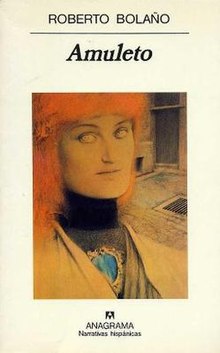Amulet (novel)

First edition (Spanish)
|
|
| Author | Roberto Bolaño |
|---|---|
| Original title | Amuleto |
| Translator | Chris Andrews |
| Country | Chile |
| Language | Spanish |
| Publisher | Anagrama |
|
Publication date
|
1999 |
|
Published in English
|
2006 |
| Media type | Print (Paperback) |
| Pages | 154 |
| ISBN | |
Amulet (Spanish: Amuleto) is a short novel by the Chilean author Roberto Bolaño (1953–2003). It was published in 1999. An English translation, by Chris Andrews, was published by New Directions in 2006.
The book is dedicated to the author's poet friend Mario Santiago Papasquiaro (1953–1998), who died the year it was being written; as "Ulises Lima", Santiago was prominently featured in The Savage Detectives and gets a cameo in this story.
Amulet embodies in one woman's voice the melancholy and violent history of Latin America. It begins: "This is going to be a horror story. A story of murder, detection and horror. But it won't appear to be, for the simple reason that I am the teller. Told by me, it won't seem like that. Although, in fact, it's the story of a terrible crime."
The speaker is named Auxilio Lacouture, dubbed "the mother of Mexican poetry", though her own take is, "I could say I am the mother of all Mexican poets, but I better not". Tall, thin, blonde, and old enough to actually be their mother, she's a Uruguayan exile living illegally in Mexico City since the 1960s, lending a maternal hand to those in need (even her forename means "Help" in Spanish), doing odd jobs for old writers and at the Faculty of Philosophy and Literature.
She becomes famous as the sole person who symbolically resists the army's 1968 invasion of the National Autonomous University of Mexico (UNAM) two weeks before the now infamous Tlatelolco massacre (2 October) – she hides in a fourth-floor lavatory cubicle "for thirteen days" from 18 to 30 September.
As she tries to outlast the occupiers and grows ever hungrier, Auxilio recalls her life, her lost teeth, her beloved friends and poets, and she soon moves on to strange landscapes: ice-bound mountains, seedy bars in "the dark night of the soul of Mexico City", a terrifying chasm, and a bathroom where moonlight shines, moving slowly from tile to tile.
Her recollections mostly drift from 1965 (when she arrived in Mexico) to 1976 (when Belano left Mexico), but end on an eponymous vision of the victims: "And although the song that I heard was about war, about the heroic deeds of a whole generation of Latin Americans led to sacrifice, I knew that above and beyond all, it was about courage and mirrors, desire and pleasure. And that song is our amulet."
...
Wikipedia
